|
Please help us to
improve the
Wikipedia article |
18th International Conference on Computational Linguistics and Intelligent Text Processing
April 17 to 23, 2017 • Budapest, Hungary
Cultural program: three full-day tours to the best attractions in and around Budapest.
Keynote: Marco Baroni, Iryna Gurevych, Björn W. Schuller, Hinrich Schütze.
Awards: best paper (monetary prizes
expected), best presentation, best poster,
best software.
See our verifiability, reproducibility, and
working description policy
Endorsed by the
Association for Computational Linguistics (ACL)
Image from travel.nationalgeographic.com
Budapest: Thermal baths |
See also photos of past CICLing events
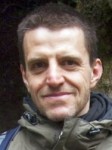 |
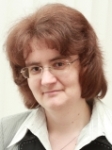 |
 |
 |
|||
| Marco
Baroni Facebook AI |
Iryna Gurevych TU Darmstadt |
Björn W.
Schuller U. Passau |
Hinrich Schütze U. Munich |

Call For Papers
This conference is the eighteenth CICLing event. Past participants' opinions include: Best NLP conference in Europe (Dan Tufiş, 2010), Fantastic conference! (Martin Kay, 2004), Everything was just great! Super-hyper-ultra-well done! (Igor Mel'cuk, 2000). We consider the following factors to define our identity:
- High reputation. CICLing is one of leading NLP conferences, ranked 7th in Computational Linguistics by Google Metrics and B by the CORE list.
- Good publication. The Lecture Notes in Computer Science (LNCS) published by Springer is a prestigious book series / journal highly valued in many countries for university promotion. CICLing is included in the ISI Thomson Web of Science, Scopus, and a number of other important indices.
- Excellent keynote speakers. We invite the most prominent scientists of the field to give keynote talks that (unlike other conferences) are published in extenso in the proceedings. Each keynote speaker also organizes an additional tutorial or discussion. They usually participate in the cultural program, where you can interact with them in an informal environment.
- General interest. The conference covers nearly all topics related to computational linguistics and natural language processing. This makes it attractive for people from different areas and leads to vivid and interesting discussions and exchange of opinions.
- Informal interaction. The conference is intended for a rather small group of professionals. This allows for informal and friendly atmosphere, more resembling a friendly party than an official event. At CICLing, you can pass hours speaking with your favorite famous scientists who you scarcely could even greet in the crowd at large conferences.
- Excellent cultural program. The conference is intended for people feeling themselves young in their souls, adventurous explorers of both science and life. Our cultural program brings the participants to unique marvels of history and nature often hidden from ordinary tourists.
- For European participants traveling to Hungary should be counted as domestic flight, which will increase the number of participants.
- Hungary is a fascinating country in central Europe with rich history, yet not so much frequented by tourists.
- If you have some extra time, you can travel to other wonderful places in Europe.
- In past years CICLing was in places that some, less adventurous, people might consider as difficult to reach or even dangerous (well, they were not). In this year we will take a break from this policy to allow those people to enjoy CICLing, too. In the next years we will return to our usual passion for exploring the world off the beaten path.
Accepted papers will be published in a volume of
or will be invited for publication in another volume or special issue of a journal derived from the conference:
-
Extended contributions of exceptionally good selected papers may be considered for publication in Cognitive Computation (SCIE).
-
A selection of papers will be invited for publication in International Journal of Computational Linguistics and Applications.
-
Extended versions of selected papers may be invited for publication in Polibits (Web of Science SciELO collection; DBLP).
-
Extended versions of selected papers may be invited for publication in a special issue of Computación y Sistemas (Scopus, Web of Science SciELO collection; DBLP).
-
A selection of papers may be invited for publication in Research in Computing Science (DBLP).
Collocated events will have their own publications.
Organization
CICLing 2017 is hosted by the Pázmány Péter Catholic University, Faculty of Information Technology and Bionics, Budapest, Hungary, and organized by the CICLing 2017 Organizing Committee in conjunction with the Pázmány Péter Catholic University, Faculty of Information Technology and Bionics, the Natural Language and Text Processing Laboratory of the CIC, IPN, and the Mexican Society of Artificial Intelligence (SMIA).
In general, we are interested in whatever helps, will help eventually, or might help computers meaningfully deal with language data.
The conference is intended to encourage exchange of opinions between the scientists working in different areas of the growing field of computational linguistics and intelligent text and speech processing. Our idea is to get a general view of the state of art in computational linguistics and its applications.
Areas of interest include, but are not limited to, the following topics, provided that the work is presented in computer-related or formal description aspects:
|
Computational linguistics research: |
|
|
|
|
Intelligent text and speech processing and their applications: |
|
|
|
We welcome works on processing any language (not necessarily English), though major languages are of more general interest. When discussing phenomena of languages other than English, please keep your discussion understandable for people not familiar with this language.
You can have a look at the contents of the proceedings of past CICLing events to get an idea of our interests. If not sure whether your topic is of interest, please ask us.
Traditionally, our keynote speakers give a formal talk, publish a paper in extenso in the proceedings, and also organize a "special event": a discussion, tutorial, experiment, or something just interesting. Such events, as well as publication of the keynote talks in the proceedings, are distinctive features of CICLing; see Past participants' opinions.
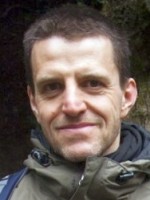 |
Marco Baroni,
Facebook Artificial
Intelligence Research Talk: From Computational Linguistics to Computers that Talk: What's Missing? Abstract: After decades of progress in computational linguistics, we are still far from seeing computers able to engage in natural conversations with humans. In my talk, I'll defend the view that end-to-end deep-learning-based architectures could in principle be used to develop full-fledged conversational agents, but the big roadblock is how to construct the right data-sets to train such architectures. I will discuss a few ideas about how we might be able to overcome this roadblock. Event: Life Hacking for Computational Linguists Abstract: A collective discussion of the best ways we found to cope with stress, deadlines, toxic colleagues, etc. Paper: "Show me the cup'': Reference with Continuous Representations |
|
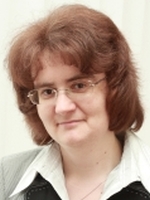 |
Iryna Gurevych, Ubiquitous Knowledge Processing (UKP) Lab,
Technische Universität Darmstadt Talk: Between Complex Expert Problems and Simple Crowd-based Solutions: Empirical Approaches to Quality in Computational Argumentation Abstract: Research in the humanities usually deals with rather complex annotation tasks and scarce labeled data sets, at least from the point of view of the conventional NLP. Mostly, the phenomena under scrutiny lack precise definitions and the investigated problems become "fluid", which requires the domain experts to iteratively propose, adjust, and validate their models; this process must then be reflected also on the NLP practitioner's side. In the field of argumentation, not only its extreme breadth ranging from philosophy to psychology, educational research, and logic but also the clash of different contradicting theories increases uncertainty for real-world NLP applications. This talk introduces our recent work in computational argumentation dealing with convincingness of Web arguments. Can we approach assessing quality of arguments without expert knowledge? Can we reliably distinguish between different qualitative properties of arguments in order to explain their convincingness? Can we scale up and obtain thousands of instances so that the recent deep-learning machinery gets a chance? What makes a convincing argument? Finally, what are the implications for solving complex expert problems? Event: arXiv.org & friends: changes in scientific publishing, drowning in information, fluid quality standards, and more |
|
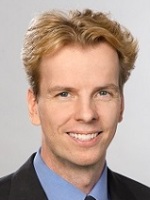 |
Björn W. Schuller,
University of
Passau, Imperial College London, Harbin Institute of
Technology, University of Geneva, Joanneum Research, aud
EERING GmbH
Talk: Reading the Author: A Holistic Approach on Assessing What is in one's Words Abstract: Computational text analysis is continuously becoming richer in ways the author of a text is "read" in terms of the states and traits of the person behind the words such as writer's age, gender, personality, emotion or sentiment to name but a few. Similarly, in the analysis of spoken language, one finds a broadening palette of such characteristics of speakers automatically analysed in recent Computational Paralinguistics research. It seems wise to assess these characteristics in one pass to understand their interrelationship rather than going one by one in isolation. As an example, it may help to estimate one's personality knowing the age, gender, and cultural background of the person. Thus, a holistic approach is advocated that aims at automatically assessing the "larger" picture of a person that wrote or spoke words of analysis. To this end, multi-task end-to-end learning is considered via memory-enhanced deep neural architectures for seamless and synchronous learning of a large number of personal attributes. Given the sparseness of resources for training that are labelled in accordingly rich ways, cross-task-labelling is introduced as a solution. In addition, automated ways to rapidly mine social media for learning data in a targeted way via small-world modelling are presented. To keep the human in the loop aiming at utmost reliable labelling, gamified dynamic cooperative learning is shown as an efficient and entertaining way to learn from "crowd-players". In the result, a highly autonomous approach towards learning to interpret a person behind her words is presented. Event: Deep Learning killed the Linguistics Star? A bit of Ouija with a dash of Serious Discussion Paper: Reading the Author and Speaker: Towards a Holistic and Deep Approach on Automatic Assessment of What is in One’s Words |
|
 |
Hinrich Schütze, Center for Information and Language Processing (CIS),
University of Munich Talk: A Tale of Two Topologies: One-Word-One-Vector Embeddings or One-Sense-One-Vector Embeddings? Abstract: It is tempting to interpret a high-dimensional embedding space cartographically, i.e., as a map each point of which represents a distinct identifiable meaning -- just as cities and mountains on a real map represent distinct identifiable geographic locations. On this interpretation, ambiguous words pose a problem: how can two completely different meanings be in the same location? Instead of learning a single embedding for an ambiguous word, should we rather learn a different embedding for each of its senses (as has often been proposed)? In this talk, I will take a fresh look at this question, drawing on simulations with pseudowords, sentiment analysis experiments and psycholinguistics. This talk will provide the motivation for the special event on nonsymbolic representation in the evening. Event: Nonsymbolic Text Representation Paper: Overview of Character-Based Models for Natural Language Processing |
|
Expression of interest (abstract) |
Contact us for late submissions |
|
Full text submission |
Contact us for late submissions |
|
Notification of acceptance |
passed |
|
Camera-ready for LNCS and pre-print versions of other papers |
passed |
|
Camera-ready for post-conf journals and volumes |
post-conf |
|
Early registration (authors) |
passed |
|
Conference |
April 17 to 23, 2017 |
Submitting a paper constitutes a consent for publication and a promise in case of acceptance to attend the conference and to pay the fee. See more details in the legal notices.
Paper submission is divided into two phases:
-
Now, please express your interest now by registering a tentative abstract of the paper via the web submission system. At this stage, the full text is not required and the tentative abstract will only be used to assign reviewers for your paper. You can update abstract, title, or full text as many times as you wish while the paper submission system is open. At this stage we only need to know the topic of your paper in order to assign adequate reviewers.
-
By the full text deadline, the authors of papers registered at the previous step should upload the full text of the paper. No changes should be made after this date (but contact the organizers if you need to make changes).
The proceedings volumes will be published post-conference; pre-print versions will be available online during the conference.
We are working on determining the lowest possible fee; the amount will be announced here. It is expected to be in line with past years' amounts.
The fee is per participant and per paper. I.e., for each paper, at least one fee is to be paid: if a participant presents two papers, two fees are to be paid. On the other hand, a participant that does not present any paper should pay a fee.
For questions, please contact us at the registration@ address as indicated here.
By submitting a paper, at least one author has thereby promised, in case of acceptance, to pay the registration fee. We will not be able to publish any paper for which the fee has not been paid (except very few papers with a special discount; see below).
Registration does not include any hard copy proceedings: almost nobody needs hard copies nowadays. You can contact us if you really need a hard copy. The proceedings will be published post-conference; we expect within two months after the conference.
We try to make the fee as low as we could. Why this fee?
-
We do our best to keep the fee as low as possible. In particular, CICLing is completely non-profit: nobody of the organizers receives any remuneration.
-
CICLing gives much more than most conferences do. In particular, CICLing provides a greater number of keynote speakers, a much wider cultural program, lunches on all working days; this inevitably affects the fee. Lowering the fee beyond reasonable level would greatly decrease the quality of the conference and the benefits for its attendees, while making negligible difference for the budget of most participants, because:
-
Most universities allocate sufficient funding for attending conferences;
-
The fee is a minor part of your total expenses, as compared with the airplane tickets and lodging.
-
-
In addition to the expenses for each participant, the fee includes a small number of waivers for poor students. Namely:
-
If you pay: You pay a bit more than is spent on your participation: you also pay for students from poor countries;
-
If you don't: A waiver does not mean waiving the fee; instead, it means that others pay for you. Your waiver increases the fee for all.
-
-
The full fee is higher than the real expenses per participant, because it includes part of the student's expenses and waivers. The student fee is lower than the real expenses, because non-students partially pay for the students.
-
We have no governmental funding. Please let us know if you can help in any way in (or give advice about) obtaining sponsorship or another kind of help.
On reduced registration fee: A very limited number of reduced fees will be available. To apply, please contact us and thoroughly justify your application. We really mean this: thoroughly justify; very many of the participants are students from poor countries, explain why you believe that they should pay for you, and how come you plan to attend an international conference if you can't even pay the fee. Eligible for reduced registration are people from underdeveloped countries in case if their institutions really cannot paying the fee (generally not included: North America, Western Europe, China, South Korea, Japan). Authors must apply for reduced registration (clearly indicating the discount amount) before submission of their paper. No applications will be considered for already reviewed papers. Notes:
- Though all papers are judged by strictly academic criteria, in borderline cases and between papers of comparable quality we may give preference to papers with fully paid fee.
- Though we will do our best for this not to happen, we cannot guarantee providing some material (including the proceedings) to participants with reduced fee. Also, in case of lack of seats in the excursion bus we will have to give preference to fully registered participants.
We are interested in a few volunteer helpers, please contact us. Speakers of the local language and residents of the local venue are preferred. The volunteers may or may not have preference in assigning fee reduction.
All papers accepted for full oral presentation at CICLing 2017 will be published in a proceedings volume edited by Springer in its Lecture Notes in Computer Science series, which is indexed in many major indices including Scopus. Papers accepted for short oral presentation plus poster presentation will be published separately in special issues of journals, see Poster Session (let us know if you actually prefer this type of publication).
In addition to the text of the paper, authors are strongly encouraged to provide code and data that permit to reproduce their results, see CICLing verifiability, reproducibility, and working description policy.
Before submitting, please check our legal notices on video recording and on obligations of authors. In particular, by submitting a paper, at least one author thereby promises, in case of acceptance, to attend the conference in person to present the paper (if possible) and to pay the corresponding registration fee. Submissions are received electronically:
Contact: See email options, fax, and the street address on www.CICLing.org/contact.html.
Starting from 2011, CICLing implements a policy of giving preference to papers with verifiable and reproducible results, i.e., papers that provide the code and lexical resources that allow to reproduce the results. This is not a requirement. If for any reason you cannot accompany your paper with the code, go ahead and submit your paper normally.
A Special best verifiability, reproducibility, and working description award will be given at the conference.
For the time being, we encourage the submitted software to be anonymous but we do not require this: your data (but not the text of your paper) can disclose your identity if there is no reasonable way of avoiding
this.To submit your data for evaluation, upload them to our FTP site ftp://ftp.cicling.org/in/CICLing-2017, as a an archive (such as Zip). The name of the archive should be CICLing_NNN.ext, where NNN is the submission ID assigned by EasyChair, for example, CICLing_123.zip. If your data are too large to be uploaded, then please send us a URL where the data can be downloaded, and we will copy your files to our server (please use Subject: "CICLing_NNN software").
Please try to make your software self-contained by reasonably including whatever is needed to run it (such as specific versions of programs). Specifically, please avoid pointing to URLs where the data can be downloaded from; instead, please include the actual data whenever possible -- this is important for reproducibility because the data on remote servers might change (or become unavailable) at any moment, while attached data will be safely stored on our servers. All programs should be submitted in source code, and all data in clearly specified, preferably human-readable, format.
Please see a detailed description of the CICLing verifiability, reproducibility, and working description policy, our reasons and goals, and some FAQ. Note that by submitting your material you allow its free distribution in case of acceptance of your paper; see more details in legal disclaimers.
Best Paper and Best Student Paper award winners are expected to receive monetary prizes from Springer.
The following awards have been given at the conference:
|
|
Best Paper awards has been given by the Award Committee basing on the reviewers' scores and judgment of the Committee members. The criteria taken into account were: novelty, originality, and importance of the reported work and overall quality of the paper. The winners were:
|
|
|
Best Student Paper award has been given by the Award Committee basing on the same criteria, but choosing out of papers whose first author is a full-time student and excluding the papers selected for a Best Paper award. The winners were:
|
|
|
Best Verifiability, Reproducibility, and Working Description award has been given by the Software Reviewing Committee for the software accompanying the paper that best fulfills the goals of our verifiability, reproducibility, and working description policy. The criteria taken into account were: the clarity, simplicity, completeness, and overall quality of the code accompanying the paper that allows to verify and exactly reproduce the claims of the paper; see more details in the instructions for software reviewers. The winners were:
|
|
|
Best Presentation award has been given to oral session authors by a ballot among all participants. The criteria taken into account were: the clarity and overall quality of the presentation, and in lesser degree the technical quality of the presented work. The winners were:
|
|
|
Best Poster award has been given to poster session authors by a ballot among all participants. The criteria taken into account were: the clarity and overall quality of the poster, and in lesser degree the technical quality of the presented work. The winners were:
|
|
|
Best Why-Boy award has been given for best questions at the talks. The award was given to:
|
It is expected that due to exceptionally good quality of the conference, Springer will contribute 1000 € for best paper awards. This fund will be distributed in the following manner:
-
400 € for best paper 1st place,
-
300 € for best paper 2nd place,
-
200 € for best paper 3rd place,
-
100 € for best student paper,
unless some of the places are shared, in which case the distribution will be different.
The papers accepted for the poster/demo session are anticipated to be published in a special issue of a journal, to be announced later. See here the guidelines for submitting and preparing your poster.
Please print your poster and bring it to the conference. We will not be able to arrange for printing on site.
Poster session will be combined with the welcome party, so people will be in good mood when reading your poster. In our experience the authors often have better opportunity to communicate their idea to interested attendees via individual live interaction at a poster presentation than via standard talk. If you feel your paper is not competitive enough for the oral session, do go ahead and submit it: a poster can be an excellent opportunity for you to get feedback.
Immediately before the poster session the poster papers will be presented (better to say, announced) orally. Each presentation will be of one minute, and you can use a couple of slides. We recommend to use one or two slides to show the title and the main idea of your work, and maybe the main results, and the final slide to show an image of your poster, for people to recognize your poster during the poster session. The purpose of this one-minute presentation is not to explain your work in detail but to attract attention of people to you and your poster. If you succeed, you will then have two hours to explain your work to all interested people, during the poster session and in fact all the breaks on other days. Please only include the main selling points of your work in this short presentation; too dense information would only confuse people.
To streamline the session, we will ask you to send us your presentation, to be pre-loaded to our laptop.
See list of accepted papers, schedule overview, and detailed schedule; also schedule of short oral + poster presentations. Note a new poster session on Wednesday.
There will be four days of technical program and three days of academic activities and cultural program (see our disclaimer about availability of tours). Here is the general layout:
|
Monday 17: |
Academic and cultural activities |
|
|
Tuesday 18: |
Keynote talk, regular talks, special event, short presentations + poster session + welcome party 1 |
|
|
Wednesday 19: |
Keynote talk, regular talks, special event, short presentations + poster session + welcome party 2 |
|
|
Thursday 20: |
Academic and cultural activities |
|
|
Friday 21: |
Keynote talk, regular talks, special event, short presentations + poster session + welcome party 3 |
|
|
Saturday 22: |
Keynote talk, regular talks, special event, awarding and closing ceremony, cultural activity |
|
| Sunday 23: |
Academic and cultural activities |
If you don't have time for the cultural program, you can arrive on Tuesday and leave on Saturday; you will miss some cultural activities.
During the conference we will have three full-day tours, tentatively with the following distribution:
|
Monday 17: |
North-West Tour: Szentendre: easter folk festival in the 460,000 m2 Szentendre open air museum; Visegrád castle; Esztergom: city, basilica, dinner, |
|
|
Thursday 20: |
North-East Tour: Egerszalók: travertine terraces (the "Hungarian Pamukkale"); Aggtelek: cave tour in the 25-km-long Baradla-Domica cave system in the UNESCO World Heritage site Aggtelek Karst region; Diósgyőr castle (tentative); Hortobágy: “Puszta” horsemen's show, country carriage ride in the puszta, horse riding, the Máta Stud Farm; dinner in Csárda. |
|
| Saturday 22: |
Boat tour with night city view; dinner on board. |
|
| Sunday 23: |
Budapest Tour: Castle, Heroes’ Square, Parliament (tentative), etc. |
See some photos and more details.
Traditionally, we exchange coins: please bring some coins of your country (except euro). We will put them on a large tray, from which you will take as many exotic coins as many you put there yours. Please bring many: 200 people (and their children) will want your coins!
See the recommended hotels. Please book a hotel now; you do not need to pay now, only book. We have reserved some rooms in the recommended hotels, with 20% discount, but the offer expires on March 15. After that date, it will be very difficult to find a room: Budapest in April is very crowded.
It is convenient for the participants to stay in the same hotel or nearby hotels, to facilitate informal interaction. Usually our participants form ad-hoc informal companies in the hotel reception to go to some restaurant, local sightseeing, etc. All cultural activities will start from the official hotel. We suggest you not to book a different hotel.
See the local info page.
Transportation schedule was changed; see new schedule and maps in the conference schedule (at the start of each day, including tours).
By submitting a paper or attending the conference you accept the following terms:
Obligations of the authors. Submitting a paper constitutes a consent for publication, acceptance of the terms specified hereby, and a promise, in case of acceptance for the main volume of the proceedings, to provide a correct and complete camera-ready version of the paper in editable (source) format, a duly filled copyright transfer form, to attend the conference (if possible), and to pay the registration fee, except in the cases agreed upon in due time with the organizers.
Software and data. Software and data accompanying the paper will be treated in the same way as the paper itself in that in case of acceptance, free access to this material can be provided to the readers of the paper or to public. By submitting software or data, you agree that in case of acceptance of the paper for the main proceedings volume, it can be freely distributed by the organizers, and anybody is allowed to copy it. This also applies to the cases when you provide only a URL: you agree that the organizers can store a copy of the data accessible via this URL and, in case of acceptance, freely distribute this copy. While you cannot restrict copying of the submitted data (otherwise don't submit it), you can restrict using your data by including a reasonable no-nonsense license, which should allow the use of the data for research purposes.
Cultural program. The cultural program is a courtesy of the organizing committee provided "as is" and intended to help the participants in visiting certain places, which they visit under their own risk and responsibility. Quality and safety. Some or all of the cultural program activities may be organized not professionally but by volunteers. We will make any reasonable effort in order for the activities to be interesting, well-organized, and safe, but we cannot guarantee any particular quality of service. Some activities may require physical effort, such as much walking or hill-climbing, and/or rely on the use of public transportation.
Force-majeure. Though so far no tours have been cancelled due to force-majeure circumstances at any of the past CICLing conferences, the following formal disclaimer applies: Some or all of the cultural program may depend on weather conditions, technical, political, or other circumstances. Permission for transportation or visiting specific places may depend on the authorities and not on the organizing committee; thus the corresponding tours can accordingly be cancelled at any moment without prior notice. Since all expenses are done in advance and are non-refundable, in case of cancellation of the tours no refund can be offered to the participants. The organizers may or may not be able to provide alternative cultural or academic activities instead of cancelled tours.Video recording. All CICLing-related activities, both academic and cultural, may be video recorded, photographed, and/or live video broadcast over the Internet or otherwise. The organizers may make the recordings and photos publicly available or provide them to third parties for any legal purpose, including storage and distribution. Unless otherwise explicitly communicated to the organizers in advance, by submitting a paper, registering for the conference, or attending the conference you authorize the organizers, attendees, or persons authorized by the organizers to video record, photograph, and/or video broadcast all conference activities, including your presentation, and to make these video recordings and photos publicly available and/or available to any third party for any legal purpose, and you also promise to explicitly confirm this authorization, in writing or otherwise, if later asked to do so by the organizers. If this is a problem, please contact us in advance.
General disclaimer. The following text does not imply any specific risk for CICLing attendees; this is a standard legal disclaimer generally applied to any public event in any part of the world: No special insurance, medical service, or security measures are guaranteed to be provided for the conference. The participants are advised to arrange with a third party for their travel insurance that includes international medical coverage, as well as to observe the standard safety precautions. The participants will take part in all activities of the conference entirely on their own risk. The organizers shall not be liable, to the extend permitted by law, for any illness, injuries, stolen objects, or any other problems that the participants may face during the cultural or academic program of the conference.
General Chair: Alexander Gelbukh
Organizing Committee
| Attila Novák | Chair | MTA-PPKE Language Technology Research Group – Pázmány Péter Catholic University | |||
| Gábor Prószéky | MTA-PPKE Language Technology Research Group – Pázmány Péter Catholic University | ||||
| Borbála Siklósi | MTA-PPKE Language Technology Research Group – Pázmány Péter Catholic University |
Ted
Pedersen
Florian Holz
Miloš Jakubíček
Sergio Jiménez Vargas
Miikka Silfverberg
Ronald Winnemöller
Alexander Gelbukh
Eduard Hovy
Rada Mihalcea
Ted Pedersen
Yorick Wiks
Please distribute the CFP! Here is a poster in different formats, please hang it on a wall in your University:
| Plain text |
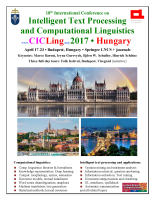 |
![]() Return to the
top of the page.
Return to the
top of the page.




(This conference is not affiliated in any way with the WASET
ICCLITP
conference, which copied our wording,
or with their
"Advances in Computational Linguistics and Intelligent Text
Processing" journal issue.)







